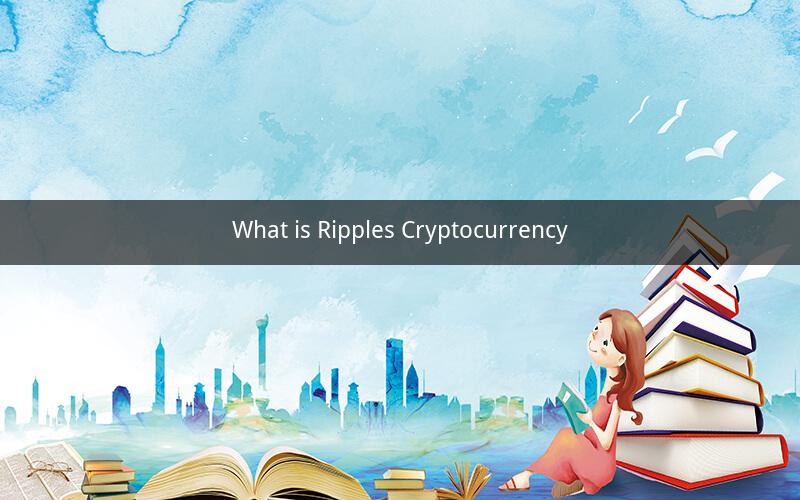
Contents
1. Introduction to Ripples Cryptocurrency
2. History and Founding of Ripple
3. How Ripple Works
- XRP Ledger
- Consensus Algorithm
- Use Cases of Ripple
4. Comparison with Other Cryptocurrencies
- Bitcoin
- Ethereum
- Litecoin
5. Benefits and Challenges of Ripple
- Benefits
- Speed and Efficiency
- Scalability
- Low Transaction Fees
- Challenges
- Regulatory Concerns
- Market Volatility
- Competition
6. Future Outlook for Ripple
7. Conclusion
Introduction to Ripples Cryptocurrency
Ripple (XRP) is a cryptocurrency designed to facilitate the movement of money across borders quickly, cheaply, and reliably. Unlike other cryptocurrencies like Bitcoin, Ripple is not meant to be a digital currency for everyday transactions but rather a tool for financial institutions to streamline international payments. In this article, we will explore the history, functionality, benefits, challenges, and future outlook of Ripple.
History and Founding of Ripple
Ripple was founded in 2012 by Chris Larsen and Jed McCaleb. Initially known as OpenCoin, the company aimed to create a decentralized digital asset exchange platform. The platform was renamed Ripple in 2013, and the XRP token was introduced as the digital asset within the platform.
How Ripple Works
Ripple operates on a unique blockchain called the XRP Ledger. Here’s a breakdown of how Ripple functions:
XRP Ledger
The XRP Ledger is a decentralized, peer-to-peer consensus ledger that records transactions. Unlike traditional blockchains, which use Proof of Work (PoW) or Proof of Stake (PoS) algorithms, the XRP Ledger uses a consensus protocol known as the Ripple Protocol Consensus Algorithm (RPCA).
Consensus Algorithm
RPCA is a novel consensus algorithm that enables the XRP Ledger to process transactions quickly and efficiently. The algorithm allows for instant finality of transactions, meaning that once a transaction is confirmed, it is considered final and irreversible.
Use Cases of Ripple
Ripple is primarily used by financial institutions to facilitate international money transfers. Its use cases include:
- Cross-border Payments: Ripple’s technology allows for fast and low-cost international money transfers, making it an attractive option for financial institutions looking to streamline their payment processes.
- Remittances: Ripple can be used to facilitate remittances, allowing individuals to send money across borders quickly and cheaply.
- Financial Inclusion: Ripple can help provide financial services to unbanked or underbanked populations by offering a cost-effective and accessible means of transferring money.
Comparison with Other Cryptocurrencies
Ripple has several key differences when compared to other popular cryptocurrencies like Bitcoin, Ethereum, and Litecoin:
- Speed: Ripple can process transactions in a matter of seconds, compared to Bitcoin’s 10-minute average transaction time.
- Scalability: Ripple’s XRP Ledger can handle a higher transaction throughput than traditional blockchains, making it more scalable for large-scale financial transactions.
- Transaction Fees: Ripple’s transaction fees are significantly lower than those of Bitcoin and Ethereum, making it a cost-effective option for international money transfers.
Benefits and Challenges of Ripple
Benefits
- Speed and Efficiency: Ripple’s fast transaction times and low transaction fees make it an attractive option for financial institutions looking to streamline their payment processes.
- Scalability: The XRP Ledger’s ability to handle a high volume of transactions makes it a scalable solution for large-scale financial transactions.
- Low Transaction Fees: Ripple’s low transaction fees make it a cost-effective option for international money transfers.
Challenges
- Regulatory Concerns: Ripple has faced regulatory challenges in various countries, which could impact its adoption and market value.
- Market Volatility: Like other cryptocurrencies, Ripple is subject to market volatility, which can lead to significant price fluctuations.
- Competition: Ripple faces competition from other cryptocurrencies and blockchain technologies that offer similar features and use cases.
Future Outlook for Ripple
The future of Ripple remains uncertain, but several factors could influence its adoption and market value:
- Adoption by Financial Institutions: If more financial institutions adopt Ripple’s technology, it could increase its market value and usage.
- Regulatory Environment: The regulatory environment in various countries could impact Ripple’s adoption and market value.
- Technological Advancements: Continued technological advancements could improve Ripple’s performance and increase its market value.
Conclusion
Ripple is a unique cryptocurrency designed to facilitate international money transfers quickly, cheaply, and reliably. Its use cases, benefits, and challenges make it an interesting option for financial institutions and individuals alike. While the future of Ripple remains uncertain, its potential to revolutionize the financial industry is undeniable.
Questions and Answers
1. What is Ripple’s primary use case?
- Ripple is primarily used by financial institutions to facilitate international money transfers.
2. How does Ripple compare to Bitcoin in terms of transaction speed?
- Ripple can process transactions in a matter of seconds, compared to Bitcoin’s 10-minute average transaction time.
3. What is the consensus algorithm used by the XRP Ledger?
- The XRP Ledger uses the Ripple Protocol Consensus Algorithm (RPCA).
4. What are some benefits of using Ripple for international money transfers?
- Some benefits include fast transaction times, scalability, and low transaction fees.
5. What are some challenges faced by Ripple?
- Some challenges include regulatory concerns, market volatility, and competition.
6. How does Ripple’s transaction fee compare to other cryptocurrencies?
- Ripple’s transaction fees are significantly lower than those of Bitcoin and Ethereum.
7. What is the future outlook for Ripple?
- The future of Ripple remains uncertain, but several factors could influence its adoption and market value.
8. How does Ripple differ from Ethereum in terms of functionality?
- Ripple is primarily designed for international money transfers, while Ethereum is a platform for decentralized applications and smart contracts.
9. What is the market capitalization of Ripple?
- As of the time of writing, Ripple’s market capitalization is approximately $15 billion.
10. Can Ripple be used for everyday transactions like Bitcoin?
- Unlike Bitcoin, Ripple is not meant to be a digital currency for everyday transactions but rather a tool for financial institutions to streamline international payments.